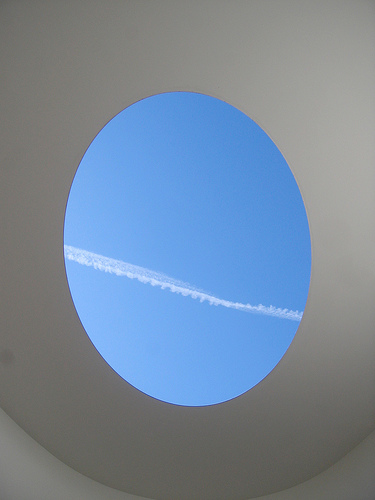James Turrell
is essentially a light artist who's most famous for his Skyspaces. I've always had a personal affinity for him, and recently decided to try to learn more about him.

James Turrell, "Light Reign," permanent installation at UW's Henry Art Gallery, image courtesy of Hankblog
I read the Geometry of Light of catalog, and decided to pick up (read: borrow from the library) the Craig Adcock book that pretty much every author referenced, James Turrell: The Art of Light and Space.
As I read through the introduction and the first chapter, both of which include some biographical info meant to establish the development of his interests, I had one of those personal ah-ha moments.
Turrell's work deals with the fundamental building block of perception - light - and how we perceive. It encourages us to fully experience, and then contemplate, the manner in which we form our worlds through exposing us to something that feels like raw perception. His early background was, unsurprisingly, in perceptual psychology.
I started college as a psych major, interested in the science of perceptual psychology (think neuropsych meets cognitive psych), and ended an art history major. I suppose it seems obvious that the connection was my interest in the formation of our mental worlds vis-à-vis the active interpretation of our visual worlds, but I'd never successfully articulated that until I started reading Craig Adcock's descriptions of James Turrell's work.
I'm beginning to think that another aspect of my intensely personal/visceral attraction to Turrell's work (and Rothko's color fields, actually) is the particular sense of timelessness that I attach to the experience of his work (at least, the one Skyspace I've encountered- it's easier to view Rothko's work in person, and I've been lucky enough to visit the Rothko chapel). I was raised utterly without religion and have grown to be a fundamentally non-spiritual person, my general agnosticism aside. Faith is a feeling I simply haven't experienced, but the overwhelming sense of timelessness that I've experienced at certain natural phenomena and (on a more mentally engaging but equally visceral level) certain art seems to me to approximate what I imagine faith must feel like. Feel being the operative word that I think creates this profound personal connection for me, and also ties to my interest in perception - because something that engages me to think about how I construct my own world (this world that seems so very solid) begins to engage and problematize the mystical faith that consciousness relies upon to parse its (our) own world.

James Turrell, "Light Reign," permanent installation at UW's Henry Art Gallery, image courtesy of Hankblog
I read the Geometry of Light of catalog, and decided to pick up (read: borrow from the library) the Craig Adcock book that pretty much every author referenced, James Turrell: The Art of Light and Space.
As I read through the introduction and the first chapter, both of which include some biographical info meant to establish the development of his interests, I had one of those personal ah-ha moments.
Turrell's work deals with the fundamental building block of perception - light - and how we perceive. It encourages us to fully experience, and then contemplate, the manner in which we form our worlds through exposing us to something that feels like raw perception. His early background was, unsurprisingly, in perceptual psychology.
I started college as a psych major, interested in the science of perceptual psychology (think neuropsych meets cognitive psych), and ended an art history major. I suppose it seems obvious that the connection was my interest in the formation of our mental worlds vis-à-vis the active interpretation of our visual worlds, but I'd never successfully articulated that until I started reading Craig Adcock's descriptions of James Turrell's work.
I'm beginning to think that another aspect of my intensely personal/visceral attraction to Turrell's work (and Rothko's color fields, actually) is the particular sense of timelessness that I attach to the experience of his work (at least, the one Skyspace I've encountered- it's easier to view Rothko's work in person, and I've been lucky enough to visit the Rothko chapel). I was raised utterly without religion and have grown to be a fundamentally non-spiritual person, my general agnosticism aside. Faith is a feeling I simply haven't experienced, but the overwhelming sense of timelessness that I've experienced at certain natural phenomena and (on a more mentally engaging but equally visceral level) certain art seems to me to approximate what I imagine faith must feel like. Feel being the operative word that I think creates this profound personal connection for me, and also ties to my interest in perception - because something that engages me to think about how I construct my own world (this world that seems so very solid) begins to engage and problematize the mystical faith that consciousness relies upon to parse its (our) own world.


0 Comments:
Post a Comment
<< Home